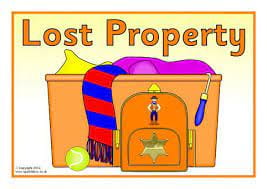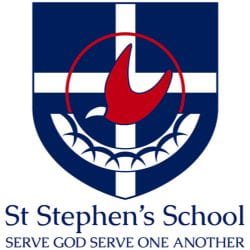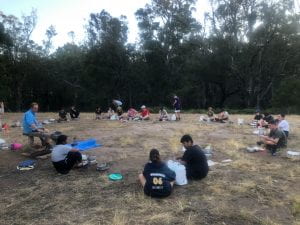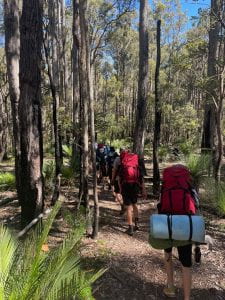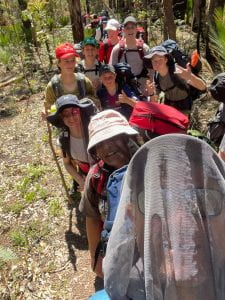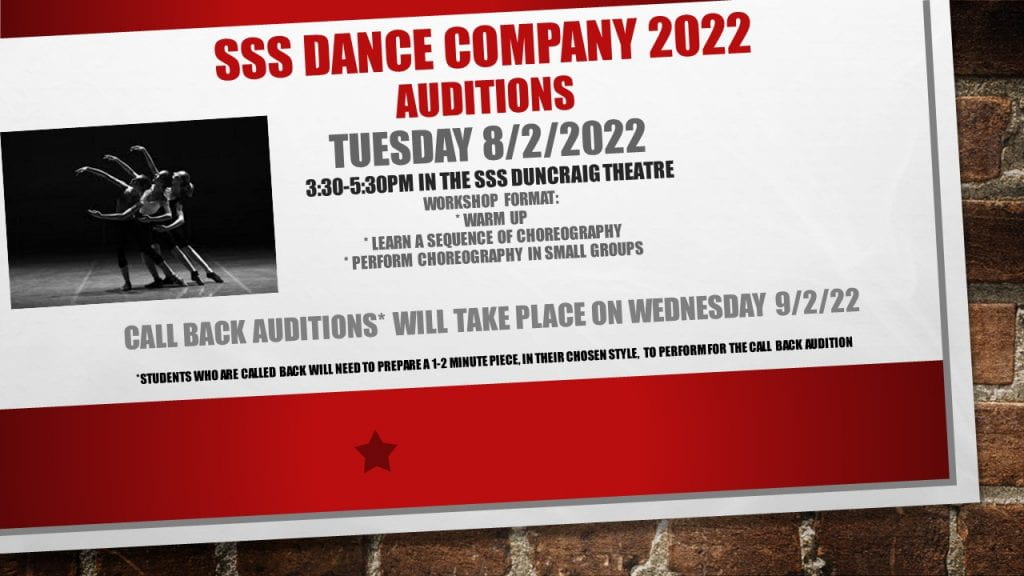PROMOTING A GROWTH MINDSET
As the 2021 academic year draws to a close there will be one primary thought occupying our minds. We will be excited to have concluded the year and will begin making our plans for the Christmas Season and summer holiday experiences. However, at this time students will receive their Academic Report for Semester Two. It is very important that students and families set some time aside to examine the final marks and grades achieved and to reflect upon achievement, the effectiveness of work habits and the setting of future goals.
With this in mind, it is useful to frame these reflections and conversations using a “growth mindset”. There are two main mindsets with which life can be navigated: growth and fixed. Having a growth mindset is essential for success.
A fixed mindset believes that the results obtained are a direct result of innate ability. They are a result of qualities that are carved in stone and can’t be changed. A growth mindset believes that results indicate what needs to be addressed, dealt with and learned from. Results will indicate what qualities need to be cultivated and worked upon. In short, the fixed mindset sees failure as an affirmation of inability whilst the growth mindset sees failure as an opportunity to learn and improve. To quote Carol Dweck, whose research established this concept: “in the growth mindset, failure can be a painful experience but it doesn’t define you. It’s a problem to be faced, dealt with, and learned from.”
In using this opportunity to reflect upon student results, there are three simple ideas that can be used to frame the discussion and will help promote a growth mindset.
- Focus discussion on work habits and effort rather than actual achievement.
It is important to recognise and celebrate high achievement but don’t praise intelligence or talent, rather, praise the work ethic. Praise (or critique) the process with which students engage in their study: their effort, their strategies, their focus, their perseverance, their improvement. A focus on process builds students who are hardy and resilient and who begin to understand that that they have personal agency in their achievement. - How we word things affects confidence. A useful approach when promoting a growth mindset, particularly when dealing with disappointing results, is to use the words ‘yet’ or ‘not yet,’ i.e. “You haven’t achieved the result you wanted yet, but you can apply yourself and you will”. Using these words will give students greater confidence, providing a future mindset that creates greater persistence. These words help students understand that they are on a learning curve. They begin to understand that their abilities can be developed. Encourage them that every time they push out of their comfort zone to learn something new and difficult, the neurons in their brain can form new, stronger connections, and over time, their understanding improves.
- Take the opportunity to set academic goals for next year. Engage in discussions about next year’s goals and possible futures beyond next year. Ask questions such as; “What do you want to achieve and why?”. Have them imagine their potential best selves. Talk to them about what they’re looking forward to, or ask them what they want to have, do and be in the future. Discuss pathways, options and possibilities.
Take the opportunity to set academic goals for next year. Engage in discussions about next year’s goals and possible futures beyond next year. Ask questions such as; “What do you want to achieve and why?”. Have them imagine their potential best selves. Talk to them about what they’re looking forward to, or ask them what they want to have, do and be in the future. Discuss pathways, options and possibilities.
Thinking about the future is important but it should be accompanied by then making plans. A stated plan of action is central in fostering optimism and hope.
This growth mindset is based on the belief that your basic qualities and level of achievement are things you can cultivate through personal efforts. It engenders motivation for stretching yourself and sticking to it, even (or especially) when it’s not going well. The growth mindset serves students well, it provides an effective attitude for their learning and is of great benefit in future pursuits beyond school.
Stephen Meagher (Deputy Head of Secondary)
YEAR 11 RETREAT 2021
What a resounding success! For 2021 the Year 11 Retreat was revamped and re-badged and, to all in attendance, it was a resounding success. The student feedback was extremely positive and the staff in loci were very satisfied with the structure and the meeting of the desired outcomes.
Based upon the premise that “You’ve got this” (alluding to Year 12), the students were encouraged to understand that they are skilled, equipped, supported and eminently able to deal with the pressures and stressors of Year 12. Indeed, they should embrace the journey and enjoy everything that the year and school has to offer.
Guest speakers, Harry Taylor (Geelong superstar and two-time Premiership player), Tessa Dorotich (2015 Alumni, staff member and professional artist) and Raj Bose and Caleb Lampard (2019 Alumni, university student and apprentice respectively) were roundly applauded and the students greeted their tips and messages with enthusiasm, circumspection, and mountains of thanks.
Activities of geocaching and high-ropes challenged the students but this was soon forgotten with the opportunity to shoot some hoops, sit and chat or swim in the pool. Finishing with a Taize style Worship service in the Chapel on Thursday evening, walking there in silence with each individual carrying a candle, was a deep, calming and reflective time for all.
Our intent is that the gift of a diary containing direction, encouragement, mindfulness tips and teachings about a growth mindset will be a critical tool to enable our 2022 Year 12s to be strong and capable and know that, indeed, “they do have this”.
What a great Retreat! Well, done to all concerned!
Brett Roberts (Head of Campus)
YEAR 9 CAMP
Last week the Yr 9s ventured down to Kaadadjan to complete the final stage of their Yr 9 COMPASS program. Starting off with a hike from Dwellingup to Kaadadjan, students then had the opportunity to participate in an indigenous cultural session, mountain biking, high ropes and rafting sessions.
In the evening they reflected on their Yr 9 journey and identified strategies that will help them navigate their way through the challenges of the future. The much anticipated “Lantern Stalk” was a highlight along with the flying ant infestation that we are sure will leave lasting memories.
Craig Thomas
LEGO LEAGUE 2022
On Saturday we once again hosted the Northern Regional Heats of the 2021 First LEGO League with some 36 schools taking part on a hot and steamy day of LEGO, teamwork, robots, nerds and fun.
I am pleased to report that our Secondary Team “Space Truckers” walked away with the “Rising All Stars” award and a place in the “Nationals” on the 11 December (woohoo!).
Please congratulate our awesome team,
Hayley Wenn, Kyra Bartels, Bethan Lockwood-Jones, Aden Randell, Steven Trinh, Elijah Bosma, David Bejan, Harry Blair, Luke Shirdon, and Torin Doak (who was unfortunately not able to attend due to illness).
The Carramar Primary (Cargo Cows) also did fantastically well taking out the Core Values trophy along with Duncraig Primary who will also join us at the Nationals.
Hopefully we will blitz then on the 11 December at Curtin.
Tim Drake

IS A LIBRARY BOOK LURKING IN YOUR HOUSE?
Could families please have a look at home for library books that may have been forgotten and return them to the library? We will be very appreciative of these lost books returning to the library so they may be read again.
Library books will have stickers on the spine showing letters, numbers or genre symbols. The book will also have a Carramar Library stamp in one of the first pages.
We would love to have these books back.
Amanda Roberts (Teacher Librarian – Carramar Secondary)
CARRAMAR SECONDARY PRESENTATION EVENING

2022 SECONDARY BOOKLIST
The 2022 Secondary Booklists are now available via the Parent Portal or via this link: https://portal.ststephens.wa.edu.au/parent-and-student/plan-the-term/book-lists.html
EXAM FAQ
Exam time can be a stressful time for the whole family. We wanted to provide a simple explanation about some of the Frequently Asked Questions we receive around results and the meaning behind some of the commonly used acronyms and phrases.
We would like to firstly note that League Tables, which have become widely used as a simple measurement of results in the media, rank schools based upon single measure metrics.
However, schools provide a range of opportunities that are not reflected in many of these tables including service learning, work experience, tours, camps and the like. Different practices between schools regarding scholarships, pathways and subject selections also mean that results are not comparing like for like.
As St Stephen’s believes in the holistic education of a child with both academic achievement and student wellbeing being central to what “success” looks like for a Year 12 graduate, perhaps a more accurate table or statistic to look at for university-bound students is what percentage of students got into university.
- What are the league tables?
While some find merit in the single metric measurements of league tables, at St Stephen’s, we find they only provide a limited snapshot of achievements and do not reflect all students who undertake Year 12 studies in different areas.
Since 2016, the three tables commonly reported on are: the percentage of students obtaining a WACE, the median ATAR and schools’ performance in VET (this is the percentage of students who achieve a Certificate II or higher compared to those who attempted it is the metric – in the last few years St Stephen’s has been achieving a 100% rating in this space).
- What is the WASSA?
All students receive a Western Australian Statement of Student Achievement (WASSA) when they complete Year 12. The WASSA was introduced to WA in recent years to bring the State’s reporting in line with the rest of the country. It formally records a student’s achievement in every course, qualification and program completed in senior secondary schooling and provides evidence of achievement.
- What is the WACE?
The West Australian Certificate of Education (WACE) is awarded to students who have successfully completed senior secondary schooling and have met the specific WACE requirements.
These include either achieving an ATAR score (complete at least four Year 12 ATAR courses) or a Certificate II (or higher) in a Vocational Education and Training (VET) qualification, plus meeting literacy and numeracy standards, grade standards and studying a breadth of subjects. More information about the requirements can be found on the School Curriculum and Standards Authority website at senior-secondary.scsa.wa.edu.au.
- What is ATAR and how is it calculated?
ATAR stands for Australian Tertiary Admission Rank. It is used to rank students who wish to enter public universities in Australia relative to one another. Find more at www.tisc.edu.au/static/guide/atar-about.tisc.
The ATAR is calculated by averaging moderated school marks and examination marks to determine a combined course mark. These scores are then standardised and then scaled.
The top 4 scaled scores of appropriate course combinations are added together to produce the School Leaver Tertiary Entrance Aggregate, this is then converted into an ATAR score. Find more here: www.tisc.edu.au/static-fixed/statistics/misc/marks-adjustment-process.pdf
- Why is calculating the ATAR so complicated?
The statistical processes used are done in the interests of fairness for all.
Moderation of school marks occurs to ensure that students are neither advantaged or disadvantaged as a result of differences in the standards of assessment and marking that occurs within different schools.
Standardising marks is to compensate for variations that may occur in the difficulty of particular examinations from year to year.
Scaling takes account of the ability of students undertaking different courses to ensure that students taking difficult courses are not disadvantaged or advantaged if they take an easier one.
- What is VET?
VET stands for Vocational Education and Training. It provides students with qualifications recognised nationally by industry and training organisations. At senior school level, the qualifications offered are usually Certificate I, II, III, or IV courses. More at senior-secondary.scsa.wa.edu.au/vet/faqs.
SSS DANCE COMPANY AUDITIONS
Application forms are available from Reception
LOST PROPERTY
If your child is missing any lost property please get them to check in each of the three Houses and also the Gym as there is a considerable amount of jackets, jumpers , water bottles and other items which will be disposed of at the end of the year if not claimed.
